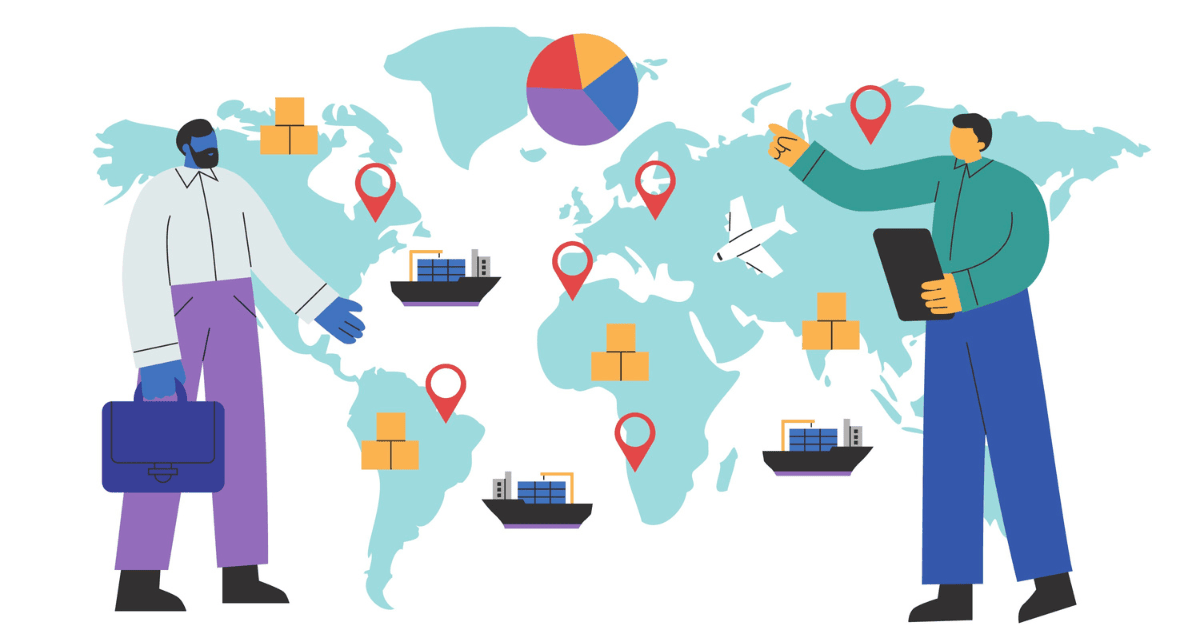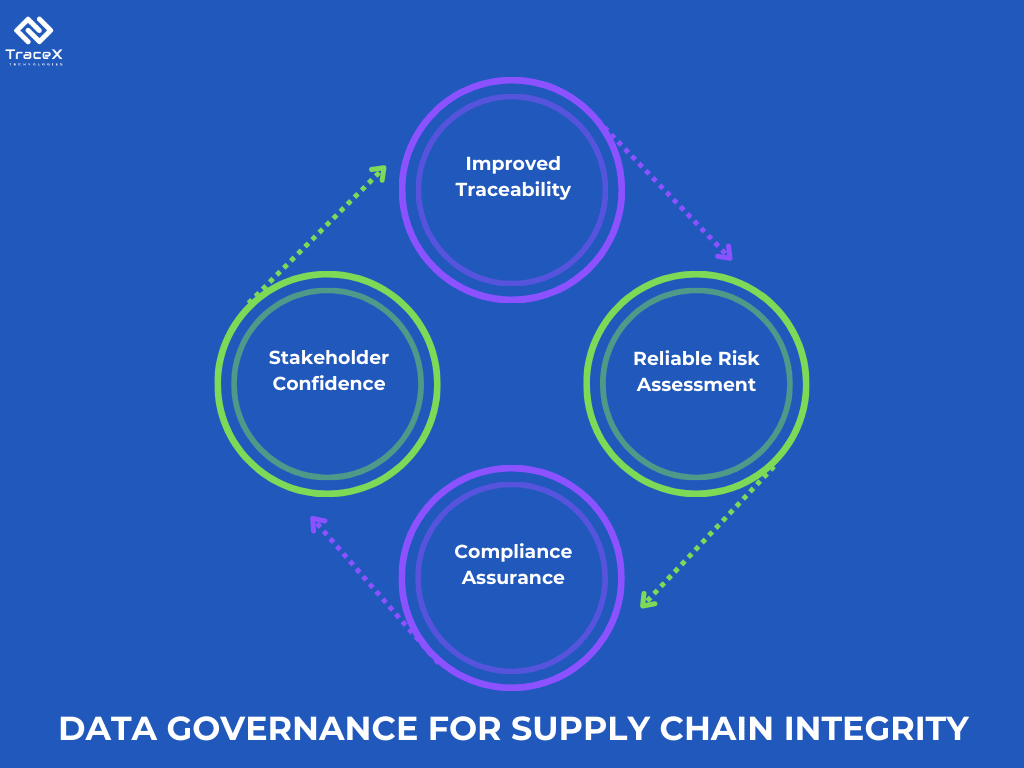Contact: +91 99725 24322 |
Menu
Menu
Quick summary: Ensure Supply Chain Integrity in EUDR Compliance with secure traceability, geolocation validation, and audit-ready reporting. Learn how digital platforms safeguard data privacy, prevent compliance gaps, and help operators and traders meet EU due diligence requirements.

Supply Chain Integrity in EUDR requires companies to prove that every step in their value chain — from raw material sourcing to final product delivery — is deforestation-free, fully traceable, and securely documented. Under the EU Deforestation Regulation, this means capturing geolocation data, maintaining unbroken chain-of-custody records, and filing accurate Due Diligence Statements. Data privacy and cloud security are critical to protecting sensitive supplier and geolocation information while ensuring audit-ready transparency. Robust digital platforms enable exporters, traders, and importers to safeguard supply chain integrity, reduce compliance risk, and build trust with regulators and customers.
Supply chain risk and monitoring tools can provide immutable records of transactions, ensuring data integrity and reducing the risk of fraud. Companies that integrate these technologies now will not only ensure compliance but also gain operational efficiencies.
Traditional paper records or spreadsheet-based systems were never designed for this level of complexity. They quickly break down when compliance teams must capture satellite geolocation data, manage thousands of Due Diligence Statements (DDS), and evaluate supplier risk across multiple countries and commodities. The result? Gaps, duplication, and exposure to compliance failures. The real battleground, then, is not just sourcing sustainably but ensuring supply chain integrity — an unbroken, provable chain-of-custody. Achieving this requires secure, integrated digital platforms that unite traceability, data privacy, and audit readiness in one system. Companies that fail to evolve risk falling behind in compliance and losing market access, while those that invest in digital supply chain integrity build resilience and long-term trust.
Key Takeaways
At its core, supply chain integrity under EUDR means more than sustainability—it means provable trustworthiness. It’s not enough to claim that timber, coffee, or rubber is deforestation-free; companies must demonstrate an unbroken chain-of-custody backed by verifiable supplier data. Every link—farmer, mill, trader, importer—becomes part of the compliance narrative.
What makes this different from past regulations is how EUDR expands the definition of responsibility. Integrity is no longer just about environmental claims; it touches IT, security, and operational accountability. Can your systems protect sensitive geolocation files from tampering? Can your DDS records be traced to the exact supplier, batch, or shipment without risk of duplication or loss? In a digital-first regulatory landscape, compliance and cybersecurity now converge.
Integrity breaks down quickly when:
Seen through this lens, supply chain integrity is not a “nice-to-have” but the ultimate compliance safeguard. The companies that can prove it will keep access to lucrative EU markets; those that can’t will face delays, penalties, or outright bans.
Don’t let data gaps break your compliance chain. Learn how to capture, manage, and report the right way.
Explore how digital traceability strengthens your EUDR strategy
Why geolocation data is the cornerstone of due diligence.
When it comes to EUDR compliance, data isn’t just an operational byproduct—it’s the lifeblood of market access. Every geolocation coordinate, supplier declaration, and due diligence statement (DDS) represents high-value, high-risk information. If mishandled, this sensitive data can expose companies to competitive leaks, legal penalties, and worst of all—invalidated compliance filings.
The overlap with GDPR obligations adds another layer of complexity. Many exporters and importers underestimate that supplier identities, farm coordinates, and traceability records count as personal and location-based data. Mishandling even one dataset—say, storing farm polygons without proper consent or security—can result in dual violations: GDPR penalties plus EUDR non-compliance.
This creates a buyer pain point rarely discussed openly: the fear that their compliance systems could actually create risk instead of mitigating it. A due diligence statement is worthless if auditors can question its chain of custody or if data is found exposed in an unsecured spreadsheet. Importers and traders don’t just need traceability; they need guarantees that their compliance data is shielded from breaches, tampering, or unauthorized access.
EUDR compliance is as much about IT security as it is about forestry or farming. A platform that encrypts, audits, and locks down compliance data not only supports legal obligations but also builds trust with suppliers and buyers who demand proof that sensitive data will never be compromised. In a market where trust is currency, data privacy is compliance.

One of the most common objections raised by compliance teams sounds deceptively simple:
“If we move compliance data to the cloud, will it really be safe?”
For EUDR compliance, that question is mission critical. The regulation doesn’t just ask companies to collect supplier and geolocation data; it demands unbroken proof of integrity. That means your cloud system isn’t merely a storage hub—it’s the frontline defence against data breaches, audit challenges, and operational risk.
Here’s the unique perspective: cloud-native platforms aren’t a risk—they are the only realistic way to scale EUDR compliance. As companies juggle multi-supplier, multi-commodity, and multi-country workflows, spreadsheets and siloed servers collapse under the weight of complexity. Cloud platforms, on the other hand, provide elastic scalability, real-time collaboration, and automated reporting at a level impossible to replicate on-premises.
The shift in mindset is crucial: Cloud is not just where compliance data lives—it’s how compliance is achieved. By turning security architecture into a core enabler, exporters, traders, and publishers can transform cloud adoption from an IT concern into a strategic compliance advantage.
Most EUDR pain points don’t come from regulation itself — they come from fragmented systems. Supplier onboarding lives in emails, geolocation in spreadsheets, DDS statements in PDFs, and audits in frantic last-minute compilations. That’s where digital traceability platforms transform compliance from chaos into control.
Centralized, tamper-proof records ensure that every DDS reference, certificate, and supplier data point is secure, unalterable, and accessible. No more missing documents during audits.
Automated workflows connect the dots — onboarding a supplier triggers geolocation mapping, which flows directly into due diligence statements, reducing manual bottlenecks and compliance errors.
Audit-ready reporting turns what used to take weeks into a one-click export. When EU authorities, or certification bodies ask, you’re already prepared.
The real impact?
With digital traceability, supply chain integrity isn’t a burden — it’s a business advantage.

TraceX EUDR solutions guarantee supply chain integrity by ensuring deforestation-free sourcing, end-to-end geolocation traceability, and secure data management. The platform provides tamper-proof digital records, automated DDS filings, and role-based access controls, reducing compliance risks. With integrated cloud security, immutable audit logs, and real-time supplier onboarding, TraceX delivers transparency, accountability, and audit-ready reporting—helping operators, traders, and exporters meet EUDR standards with confidence.
TraceX ensures unbroken chain-of-custody by digitally mapping every stage — from farm geolocation → raw material → processing → transport → finished goods. Each handover is logged in a tamper-proof, blockchain-enabled ledger, so integrity is never compromised.
EUDR compliance hinges on accurate geolocation. TraceX captures, validates, and stores farm-level coordinates and supplier declarations, linking them to batches and Due Diligence Statements (DDS). This eliminates risks of missing or unverifiable data breaking the chain.
Supply chain integrity also depends on how data is handled. TraceX secures sensitive supplier and location data with:
Unlike spreadsheets or local systems, TraceX provides immutable audit logs, real-time dashboards, and one-click reports for EU authorities. Its cloud-native design scales across multi-commodity, multi-supplier networks, ensuring consistent compliance even in complex supply chains.
Supplier onboarding → geolocation validation → DDS creation → submission to the EU database — TraceX automates these steps, minimizing manual errors and guaranteeing that data integrity is maintained throughout the process.
As the EU Deforestation Regulation (EUDR) approaches full implementation, ensuring robust supply chain integrity is paramount for compliance and long-term success. By leveraging advanced technologies, engaging stakeholders, and implementing rigorous auditing practices, businesses can navigate the complexities of EUDR effectively. The commitment to transparency, traceability, and accountability not only helps meet regulatory requirements but also fosters trust and enhances sustainability efforts. Proactive preparation and continuous diligence in managing and monitoring supply chains will be essential in aligning with EUDR standards and achieving a deforestation-free supply chain.
Want to dive deeper into compliance essentials? Explore our in-depth blogs on
to strengthen your compliance strategy.
Supply chain integrity refers to maintaining a secure, verifiable, and unbroken chain of custody across all supply chain actors. This includes linking farm-level geolocation data, supplier declarations, and Due Diligence Statements (DDS) without gaps or missing records.
EUDR requires handling sensitive supplier and geolocation data. If not stored securely, data breaches or loss could invalidate DDS filings, expose companies to GDPR penalties, and compromise compliance credibility.
They provide centralized, tamper-proof record-keeping, automate supplier onboarding and DDS filing, enforce role-based access, and generate audit-ready reports — ensuring that compliance data remains secure, accurate, and regulator-trusted.
